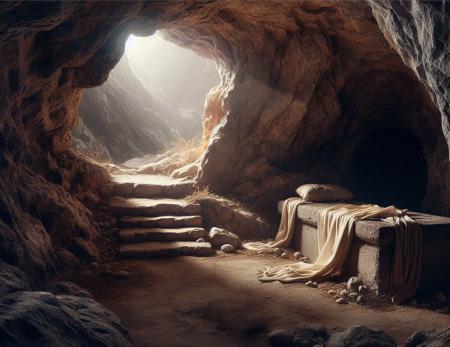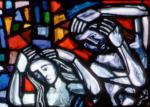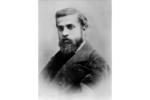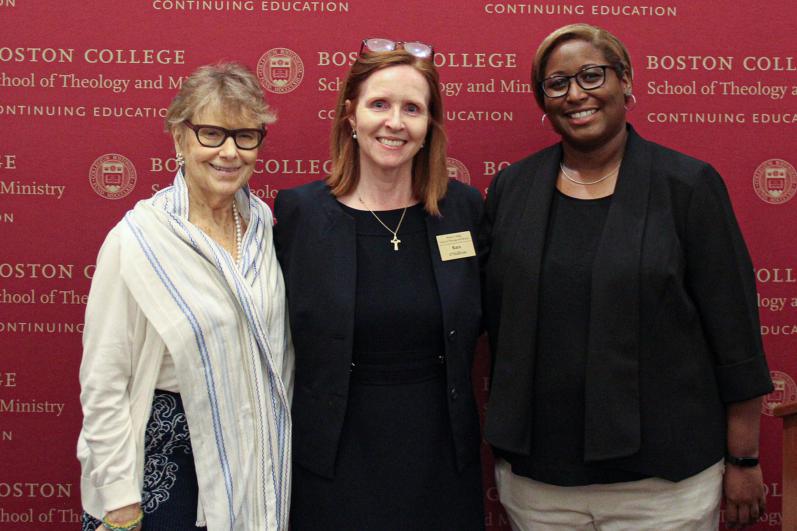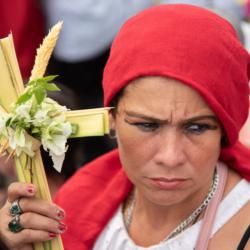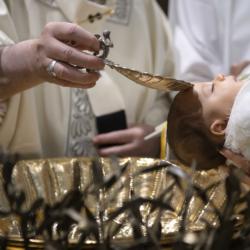Biblical women celebrated, reexamined at Boston College event
CHESTNUT HILL -- Boston College's School of Theology and Ministry (STM) hosted its 14th annual celebration of St. Mary Magdalene on July 20 with a special Mass and a presentation on interpretations -- and common misunderstandings -- of women in the Bible.
The school has hosted an annual celebration around the July 22 feast of Mary Magdalene since 2009. The event includes a liturgical celebration and a lecture by a distinguished scholar about the legacy of women in the Church.
This year's Mass was celebrated by Father Stephen Okoli in St. Ignatius Church and drew dozens of people from the Boston College community. The liturgy featured hymns about Mary Magdalene and the other women who supported and accompanied Christ during his earthly ministry.
After the Liturgy of the Word, visiting scholar Dr. Mary D'Angelo from the University of Notre Dame shared a reflection on Mary Magdalene.
Prior to Vatican II, Mary Magdalene was listed in the Church's calendar as "the penitent," conflating her with the unnamed woman in Luke 7:36-50 as well as Mary of Bethany, who both anointed Jesus with perfume. This idea was a popular legend in the early centuries of the Church and was encouraged by Pope Gregory I by 591. It was only officially corrected by the Vatican in recent years. But the image of Mary Magdalene as a repentant sinner, and particularly someone guilty of sexual sin, has remained strong in popular culture.
D'Angelo spoke at length about Mary Magdalene's role as the "apostle to the apostles." She said that the liturgy's use of the Song of Songs on her feast day points to the saint's "longing and devotion" for Jesus, who she sought like the bride seeking her missing bridegroom.
D'Angelo said that the inclusion of Mary Magdalene's preface in the Eucharistic prayer was "acknowledging the apostleship of women and embedding that recognition deep into the heart of the liturgy." She also pointed out that Mary Magdalene's claim that she had seen the Lord (John 20:18) was the same claim that St. Paul used to assert his apostleship (1 Corinthians 9:1).
After the Mass, the assembly reconvened in the Heights Room inside the Corcoran Commons. There, they had lunch and heard a presentation from Dr. Jaime Waters, associate professor of Old Testament at the STM.
Waters said that her presentation, titled "Rereading Biblical Women," was inspired by Mary Magdalene, although it did not focus on her.
"Like Mary Magdalene, there are other biblical women who should be reread to get a better understanding and perspective on their stories. With a reread we might honor them better, and their legacies, and the richness they bring to biblical study and to theological reflection," Waters said.
She examined three female biblical figures who are often misrepresented, even in the Church: the Samaritan woman at the well in the Gospel of John; Hagar, the slave of Sarah, in the book of Genesis; and Jezebel, the infamous Phoenician queen, in 1 and 2 Kings.
The Samaritan woman's encounter with Christ is recounted in John 4:4-42. When they meet at Jacob's Well, Jesus engages her in a theological discussion, despite the gender and ethnic differences that she points out between them. Christ uses Old Testament imagery of water, a symbol of a God who sustains, to reveal theological truths about himself. Jesus is aware that she has had five husbands and is living with a man she is not married to; his knowledge convinces her that he is a prophet. The woman reveals her desire to know the Messiah, a title that Jesus had not claimed up to that point in the evangelist's narrative.
Like Mary Magdalene, the Samaritan woman testifies about her encounter with Christ and leads others to him, but emphasis is often placed instead on her marital status and possible sexual history. Because of this, she is often portrayed as a repentant sinner rather than a preacher.
Waters said that she is intentional in highlighting the Samaritan woman's "openness," "engagement in theological discussion," and testimony that inspires her community to meet and believe in Jesus.
"I've tried to direct our attention to the elements of the narrative that capture what the text is about: encountering Christ, being open to the Gospel, and proclaiming it to others. That it's a woman who does this, who's a Samaritan, an outsider who has this encounter, shows us the range of who is called to proclaim the Gospel, everyone, and anyone's call to hear, to preach, and to inspire," Waters said.
She pointed out that when the story is proclaimed in the Mass on the Third Sunday of Lent in the Year A cycle, there are long and short options for the text. The short option leaves out the statement that the Samaritan woman's testimony led others to believe.
"This is what I'd call a slight. This is troubling, and a good reason to proclaim the full text," Waters said.
The next woman she talked about was Hagar, the slave that Sarah gives to Abraham to be his concubine in order to have children. Hagar has two encounters with God at a time of desperation, and she receives blessings that parallel those of Abraham (Genesis 16:1-16 and 21:1-21). First, when Hagar is pregnant and has fled Sarah's abusive treatment, an angel tells her to return and promises that she will have many descendants. Later, after Abraham sends Hagar and her son Ishmael away, she expects to die in the desert, and raises her voice in prayer. God responds by sending an angel again and showing her a well with water for them to drink.
Waters acknowledged that the angel's instruction for Hagar to return to Sarah and Abraham is "complicated" and "problematic." It has been misinterpreted to suggest that victims of abuse should return and submit to their abusers.
"Instead, we must remember the larger story at work here. Abraham's story is focused on covenant, with the recurring promise of descendants," Waters said.
Waters explained that much of the story of Abraham is focused on the promise of children, and that Hagar plays a role in that. She cited Delores Williams' view that Hagar's experience parallels the experience of African-American women, not only in her struggles as a slave and single mother, but in her hope, resilience, and calling out to God.
"Rereading Hagar as a figure of empowerment in the midst of oppressive systems allows us to acknowledge the ways in which she tries and succeeds in making decisions for herself and her son," Waters said.
She said she thinks that Hagar "comes through as a survivor." Hagar is instructed to name her son Ishmael, which means "God hears," and she names God El-Roi, which means "God who sees."
"Her repeated encounters with God serve as a strong theological statement on a God who cares about those who are oppressed," Waters said.
Finally, Waters talked about Jezebel, the wife of the Israelite king Ahab and enemy of the prophet Elijah. Although not meant to be a role model, she, too, has been misunderstood and misrepresented, Waters said. The biblical authors report that she killed God's prophets and promoted the worship of other gods. But instead of being remembered for that, Jezebel's name has become a derogatory term for a woman, associated with sexual impropriety.
Waters suggested that this association may have come about because many Old Testament authors used metaphors of infidelity and prostitution to symbolize idolatry. Additionally, speculation about how Jezebel influenced her husband to do evil, and the fact that she put on makeup when her enemies were coming to kill her, gave rise to the idea of her as an enticing temptress.
"The Bible's consistently negative statements made it easy to disconnect the historical figure of Jezebel, and instead begin to use her name as (in a way) associated with hypersexuality and manipulation," Waters said.
This idea took on a racialized aspect in the 18th century, becoming a stereotype of African-American women that was used to justify their sexual abuse. Waters said this demonstrates that "There are dangers, generally, in not only misreading or misinterpreting texts but also being selective about choosing harmful interpretations."
"In the case of Jezebel in particular, the extreme disconnection from the biblical text, and the use of the name and character to promote sexist and racist tropes, shows the danger in the misuse and misappropriation of scripture," Waters said.
She said she sees Jezebel as "an important example of how misreadings can get out of control, how they can be damaging, especially when you're so disconnected from what the text offers and clouded by biases."
In closing, Waters said she hoped that those attending her lecture felt "empowered" to go back, read the biblical texts, and think critically about them, and that doing so would inspire further study and prayerful reflection.
Diane Oliveros, a PhD student in theology and education at Boston College, has been a student of Waters and attended the Mary Magdalene celebration. She said she felt from Waters' presentation "a growing sense of not just sympathy but becoming more empathic towards the different persons we were talking about in the Bible."
"I think that can influence how we can also be more empathic and compassionate in our dealings with each other, in the Church, and in society," she said.
